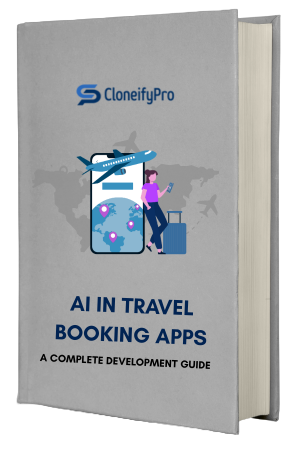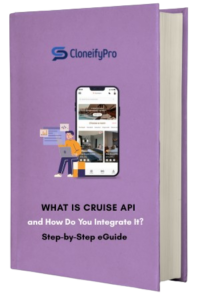Introduction
The travel industry has undergone a massive digital transformation over the past decade, and one of the most revolutionary changes has been the integration of Artificial Intelligence (AI) into travel booking apps. From personalized recommendations to instant customer support, AI is reshaping the way travelers plan, book, and experience their trips.
For businesses investing in travel portal development, AI is no longer a luxury – it’s a necessity. In this guide, we’ll explore how AI is revolutionizing travel booking applications, the key technologies involved, and the step-by-step process for developing a feature-rich, AI-powered travel platform.
1. Why AI is a Game-Changer in Travel Booking Apps
AI enables travel businesses to:
- Personalize the User Experience – By analyzing past bookings, searches, and preferences.
- Automate Customer Service – Using AI chatbots for instant responses.
- Predict Pricing Trends – Helping travelers book at the right time for the best deals.
- Enhance Search Accuracy – With natural language processing for better search results.
- Streamline Operations – Automating tasks like ticket confirmations and cancellation handling.
According to recent reports, AI-driven personalization can increase booking conversion rates by up to 30%. For businesses, this means better customer retention and higher revenue.
2. Core AI Features in Modern Travel Booking Apps
When integrating AI into your travel portal software development strategy, consider these must-have features:
a) AI Chatbots & Virtual Assistants
- Provide 24/7 customer support.
- Answer FAQs instantly.
- Assist with booking changes or cancellations.
b) Personalized Recommendations
- Suggest destinations, hotels, and packages based on user history.
- Offer customized itineraries for unique travel experiences.
c) Dynamic Pricing & Fare Prediction
- AI algorithms track price changes and predict the best booking time.
- Help travelers save money and plan efficiently.
d) Voice Search Integration
- Enable hands-free search for flights, hotels, or packages.
- Ideal for multitasking travelers.
e) Sentiment Analysis
- Analyze customer reviews and ratings to improve services.
f) Fraud Detection
- AI monitors unusual booking patterns to prevent fraud and secure payments.
3. How AI Enhances Travel Portal Development
AI isn’t just a feature—it’s a foundation for building a competitive travel platform. Here’s how it plays a role in travel portal development:
- Improved Search & Filtering – AI understands natural language queries and delivers more relevant search results.
- Better UX Design – AI-driven analytics help developers create user-friendly interfaces based on user behavior patterns.
- Automated Back-End Operations – Reduces manual workload for travel agencies.
- Data-Driven Decision Making – AI insights help in planning marketing campaigns and improving offerings.
4. Step-by-Step Process for Developing an AI-Powered Travel Booking App
Step 1: Define Your Goals
Decide whether your app will focus on hotel bookings, flight reservations, complete travel packages, or all-in-one solutions.
Step 2: Choose the Right Technology Stack
- Frontend: React Native, Flutter for cross-platform support.
- Backend: Node.js, Python (preferred for AI integration).
- Database: MongoDB, PostgreSQL.
- AI Tools: TensorFlow, Dialogflow, IBM Watson.
Step 3: Integrate Core Travel Portal Development Modules
- User registration & profiles.
- Booking engine.
- Payment gateway.
- AI recommendation system.
- Chatbot support.
Step 4: Build and Train AI Models
- Feed the AI with travel industry datasets.
- Train it to understand pricing patterns, user behavior, and search intent.
Step 5: Testing & Quality Assurance
- Test AI accuracy for recommendations and pricing predictions.
- Ensure chatbot responses are relevant and helpful.
Step 6: Launch & Continuous Improvement
- Roll out your app in stages.
- Use analytics to refine AI algorithms over time.
5. Benefits of AI in Travel Booking Apps
- Higher Conversion Rates – Personalization encourages faster decision-making.
- 24/7 Availability – Chatbots provide constant customer assistance.
- Cost Efficiency – Automation reduces operational costs.
- Scalability – AI systems can handle increasing customer demands without slowing down.
- Enhanced Customer Loyalty – Consistently personalized experiences encourage repeat bookings.
6. Challenges in AI-Based Travel Portal Development
While AI offers massive opportunities, businesses must be aware of challenges:
- High Initial Investment – AI integration can be costly upfront.
- Data Privacy Concerns – Compliance with GDPR and other regulations is crucial.
- Need for Skilled Developers – AI development requires expertise in machine learning and data science.
- Continuous Data Feeding – AI models need constant updates to stay relevant.
7. Future Trends in AI-Powered Travel Apps
- Augmented Reality (AR) Travel Previews – AI combined with AR to let users preview destinations.
- Hyper-Personalization – Real-time itinerary changes based on traveler’s mood, weather, or events.
- Blockchain for Secure Payments – Enhanced trust and transparency.
- AI-Driven Sustainability – Promoting eco-friendly travel choices.
Conclusion
AI is not just a feature—it’s a complete transformation in the travel booking experience. For companies investing in AI-powered travel portal development, integrating AI is the key to staying competitive, offering unmatched personalization, and improving operational efficiency.
The future belongs to businesses that combine technology with customer-centric solutions. By leveraging AI in your travel booking app, you can position your brand as a leader in the evolving travel tech market.




